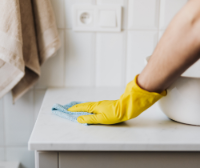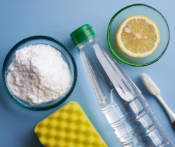Contact
Arkansas Extension Homemakers
Email: ehc@uada.edu
University of Arkansas System Division of Agriculture
Cooperative Extension Service
2301 S. University Avenue
Little Rock, AR 72204
Spring Cleaning: Cleaner Alternatives
With spring just around the corner, spring cleaning may be on your mind! Spring cleaning is all about deep cleaning the areas that may have been neglected the rest of the year.
It feels good to clean. It makes your home smell better and more pleasant to be in. A clean home is welcoming, no doubt, but cleaning products can be harmful and problematic for small children, pregnant women, and those with asthma, allergies, or other sensitivities to smells.
Store bought cleaners can irritate the skin, lungs, and eyes as well as be corrosive, toxic, and flammable, which can have a negative impact on your health. It only takes 26 seconds for chemicals to show up in our bodies, and there are 150 approved chemicals found in household cleaners that are linked to birth defects, allergies, cancer, and psychological abnormalities. These chemicals can also pollute the environment by entering the septic systems and soil, which can negatively impact the earth, water supplies, and wildlife.
Luckily, there is a cheaper, safer, and more environmentally friendly way to clean. By making your own cleaning products at home you can clean effectively, live healthier and cause less environmental damage. Here are some common household cleaners and their safer alternatives:
Bases/Alkalies
Bases/Alkalies are good for removing oil stains and dirt. A chart for mild, moderate, and strong bases can be seen below.
Mild |
Moderate |
Strong |
| Baking Soda | Household Ammonia | Washing Soda |
| Borax | Lye |
Acids
Acids are used in cleaning to break down rust and mineral deposits. Clleaners containing acids are toilet and bathtub cleaners, hard water removers, and mold solutions.
Some mild acids that can be used as an alternative to store bought acidic cleaners
are cola, lemon juice, and vinegar.
Detergents
Detergents loosen dirt and remove oils from surfaces, which is why detergents are commonly used for laundry and dishes. Store bought detergents may smell nice, but they often contain toxic chemicals that can cause allergic reaction, skin or throat irritation, cancer, and air and water pollutants.
Safe alternatives to store bought detergents without all the extra chemicals are borax
or washing soda. You can also castille soap if you need a "heavy duty" cleaner.
Abrasives
Abrasives are used for scrubbing dirt and grime off surfaces. Examples of abrasives are scouring pads, steel wool, mesh, sandpaper, and powders. Courser and larger particles create a harsher abrasive, while fine powders or fine grain sandpaper are softer. Abrasives can be very helpful, but using too often or applying to much pressure while in use, abrasives can be scratch surfaces causing damage.
Some cleansers or cleaning powders may have harsh chemicals added. Alternatively,
using a sponge with a scrub pad, baking soda, or salt can be used as mild abrasives.
Bleaches
Bleach is used to whiten fabric and disinfect surfaces. The most common bleach is
chlorine, which is highly toxic. Try instead washing soda, hydrogen peroxide, or citrus.
These are much safer and have a much milder, more pleasent scent.
Sanitizers/Disinfectants
Sanitizers/Disinfectants are products that reduce the number of bacteria on a surface.
These products are commonly found in bathroom and kitchen cleaners as well as wipes
to be used on multiple surfaces. Their purpose is to keep surfaces sanitary, but they
also help keep areas smelling fresh. Bleach is common disinfectant that is toxic and
has a harsh smell. Vinegar has found to be effective in reducing bacteria but is not
toxic and the vinegar smell disappears quickly. Hydrogen peroxide, citrus, and essential
oils such as lavender, tea tree, and pine are also useful alternatives to bleach.
Air Fresheners
Air fresheners smell good and helps your space smell good. Conventional air fresheners are plug-ins, sprays, and candles, all of which often use harmful chemicals in their ingredients.
Some simple alternatives for air fresheners are opening windows, simmering spices on the stove, baking cookies, diffusing essential oils, and citrus. An open container of baking soda can also absorb odor in spaces such as a closet or refrigerator.
